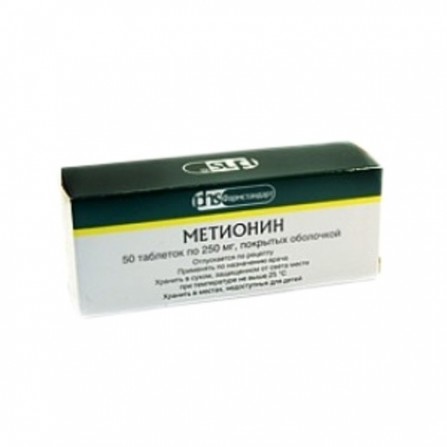Methionine coated pills 250mg N50
Condition: New product
1000 Items
Rating:
Be the first to write a review!

More info
Description
Ingredients Methionine 250 mg Auxiliary substances: methylcellulose (water soluble methylcellulose) - 2.237 mg, microcrystalline cellulose - 47.559 mg, stearic acid - 3.356 mg, magnesium stearate - 3.356 mg, potato starch - 23.492 mg. The composition of the shell: hypromellose - 7.25 mg, polysorbate 80 - 2.207 mg, titanium dioxide - 0.54 mg, dye azorubine (E122) - 0.003 mg. Pharmacological action An essential amino acid necessary to maintain growth and nitrogen balance of the body. It contains a methyl group that is involved in the process of peremetilirovaniya and is necessary for the synthesis of choline. Due to this, it normalizes the synthesis of phospholipids from fats and reduces the deposition of neutral fat in the liver. Participates in the exchange of sulfur-containing amino acids, in the synthesis of epinephrine, creatinine and other biologically active substances, activates the action of hormones, vitamins (B12, ascorbic, folic acids), enzymes, proteins, peremetylation, deamination, decarboxylation reactions. Required for detoxification of xenobiotics. When atherosclerosis reduces the concentration of cholesterol and increases the concentration of blood phospholipids.
Dosage and administration
Adults - 500 mg-1.5 g 3-4 times / day. Single doses for children under the age of 1 year - 100 mg, at the age of 1-2 years - 200 mg, at the age of 3-4 years - 250 mg, at the age of 5-6 years - 300 mg, at the age of more than 7 years - 500 mg. the multiplicity of reception - 3-4 times / day. Take 1 / 2-1 h before meals. The course of treatment is 10-30 days or 10 days with 10-day breaks. Precautions During the period of treatment may worsen psoriasis. With pheochromocytoma, propranolol can be used only after taking an alpha blocker. After a long course of treatment, propranolol should be discontinued gradually, under the supervision of a physician. Against the background of treatment with propranolol, IV administration of verapamil, diltiazem should be avoided. A few days before anesthesia, you must stop taking propranolol or pick up a remedy for anesthesia with minimal negative inotropic effects. Influence on the ability to drive vehicles and control mechanisms In patients whose activities require increased attention, the question of the use of propranolol on an outpatient basis should be addressed only after evaluating the individual response of the patient. Side Effects Possible: allergic reactions.In some cases: nausea, vomiting (due to unpleasant odor and taste). Cautions Use with caution in renal failure (the danger of increasing hyperazotemia). When methionine was used in patients with atherosclerosis, a decrease in blood cholesterol levels and an increase in phospholipid levels was observed. It should be prescribed in balance with other amino acids. Unbalanced use of methionine in large doses can have a damaging effect on the cells of the liver and other organs. Application during pregnancy and lactation Type: Medicine Quantity in packaging, pcs: 50 Shelf life: 60 months Active ingredient: Methionine (Methionine) Route of administration: Oral Vacation: No prescription Release form: No prescription Storage conditions: In a dry place, Protected from the sun, keep out of the reach of children. Maximum storage temperature, ° С: 25 Pharmacological group: A16AA Amino acids and their derivativesActive ingredients
Methionine
Release form
Pills
Composition
Methionine 250 mg. Excipients: methylcellulose (methylcellulose water soluble) - 2.237 mg, microcrystalline cellulose - 47.559 mg, stearic acid - 3.356 mg, magnesium stearate - 3.356 mg, potato starch - 23.492 mg. The composition of the shell: hypromellose - 7.25 mg, polysorbate 80 - 2.207 mg, titanium dioxide - 0.54 mg, dye azorubine (E122) - 0.003 mg.
Pharmacological effect
An essential amino acid necessary to maintain the growth and nitrogen balance of the body. It contains a methyl group that is involved in the process of peremetilirovaniya and is necessary for the synthesis of choline. Due to this, it normalizes the synthesis of phospholipids from fats and reduces the deposition of neutral fat in the liver. Participates in the exchange of sulfur-containing amino acids, in the synthesis of epinephrine, creatinine and other biologically active substances, activates the action of hormones, vitamins (B12, ascorbic, folic acids), enzymes, proteins, peremetylation, deamination, decarboxylation reactions. Required for detoxification of xenobiotics. When atherosclerosis reduces the concentration of cholesterol and increases the concentration of blood phospholipids.
Indications
Liver diseases proceeding with fatty infiltration of hepatocytes: toxic hepatitis, hepatosis (including alcoholic), cirrhosis, liver dystrophy. intoxication.Prevention of toxic liver damage with arsenic, chloroform, benzene, alcohol. As part of combination therapy: protein deficiency of various origin, atherosclerosis, diabetes.
Contraindications
Hypersensitivity to methionine, severe liver failure, hepatic encephalopathy, viral hepatitis.
Dosage and administration
Adults - 500 mg-1.5 g 3-4 times / day. Single doses for children under the age of 1 year - 100 mg, at the age of 1-2 years - 200 mg, at the age of 3-4 years - 250 mg, at the age of 5-6 years - 300 mg, at the age of more than 7 years - 500 mg. the multiplicity of reception - 3-4 times / day. Take 1 / 2-1 h before meals. The course of treatment is 10-30 days or 10 days with 10-day breaks.
Side effects
Possible: allergic reactions. In some cases: nausea, vomiting (due to unpleasant odor and taste).
special instructions
Possible: allergic reactions. In some cases: nausea, vomiting (due to unpleasant odor and taste).


